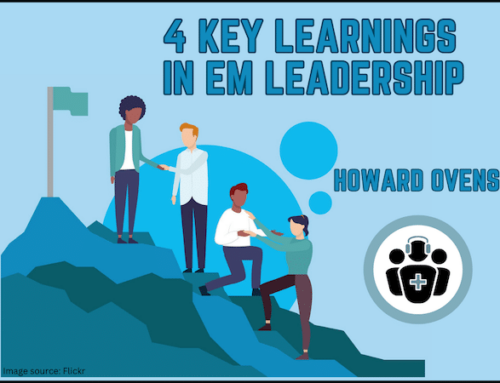Funding and freeing the future of learning that is FOAMed
Longtime followers of EM Cases will have noticed a progressively prominent display on its website of the logo and inclusion of the name of the Schwartz/Reisman Emergency Medicine Institute — or SREMI —over the past two years. Some of you may have wondered what an Emergency Medicine Institute is, and what this one has to do with EM Cases. It’s about funding FOAMed.
What is SREMI?
SREMI was established in November 2013 by a founding gift from our patrons, Gerald Schwartz and Heather Reisman. It is a partnership of Mount Sinai Hospital (now part of the Sinai Health System) and North York General Hospital in Toronto. Our vision is to advance the discipline of emergency medicine through the development of new knowledge — research and translating that knowledge into practice — as well as advocating for system improvement through better public policy.
The partnership brought together two hospitals that already knew each other well and collaborated extensively; Mount Sinai brought strength in research and education including simulation, North York added its national reputation in continuing medical education.
Dr. Anton Helman, the founder of EM Cases, is on staff at North York General ED. We were familiar with his amazing creativity and energy and many of our staff had participated in his podcasts. At the time SREMI was taking shape, Dr. Helman was beginning to realize that using a subscription model was limiting the growth of and access to his work, and that taking his vision to fruition would require some adjustments. We felt absorbing EM Cases into the creative work of SREMI was a huge win-win. As a non-profit academic institution, we believed in the FOAMed concept and together we decided to eliminate subscription fees. We’ve got faculty to support Dr. Helman’s efforts on content as well as staff to assist in production, and we can generate the funds to keep it afloat from donations, grants and other revenue. We protect Dr. Helman’s time to work on EM Cases just as any academic institution should protect the time of their researchers and educators if they are serious about the work they are doing.
The Power of FOAMed
For me, my “aha” moment on the power of newer media came in the fall of 2014 during the North American Ebola hysteria. In Canada, the province of Ontario issued directives — legally binding orders to hospitals — on Ebola planning and preparation; the directives seemed excessive and confusing to many. In my position as an advisor to the Ontario government on emergency services, many colleagues were asking me for advice in interpreting the directives. I was happy to provide that advice but was struggling to keep up with events by phone and e-mail. Dr. Helman suggested a podcast. We recorded it in my office within two hours of his suggestion; he edited it and posted it within 24 hours of that; and within a few days it had more than 10,000 hits. That’s probably more people than have read any of my previous peer-reviewed publications! It also appeared faster and was therefore of more use than any journal publication.
The old format of peer-reviewed publications and expensive subscriptions is obsolete; the visionaries of the FOAMed world are innovators who can bring high-quality information to their peers in a much timelier and responsive medium.
Academic Institutions and funding FOAMed
I am tremendously proud that EM Cases is the first EM podcast to be wholly funded and supported by a non-profit academic institution. Academic leaders are falling behind our trainees and younger faculty; we need to find and nurture these stars of the podcast world, and universities need to value the impact of newer media when evaluating people for promotion. In the meantime, we hope you continue to enjoy EM Cases and know that SREMI will allow us to provide even more great content as we move forward — we’ve already improved the access.





[…] about the elephant in the room, Howard Ovens discusses the ‘Free’ in FOAMed and investigates the idea of funding FOAMed to achieve sustainability. […]